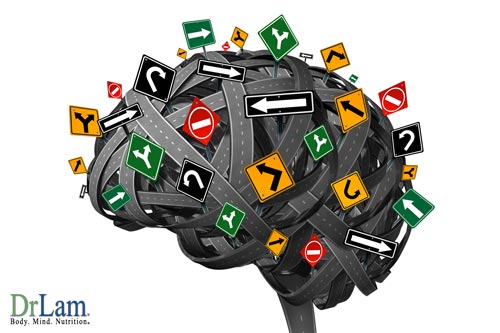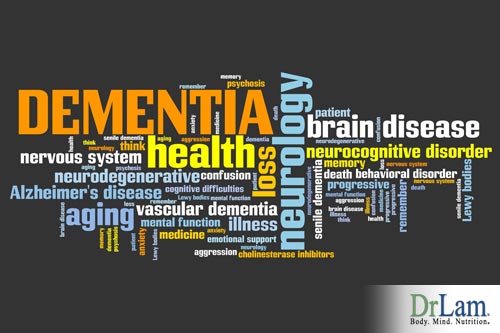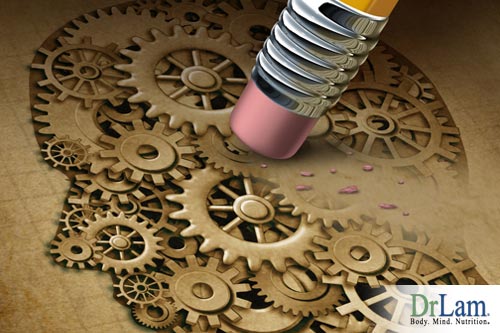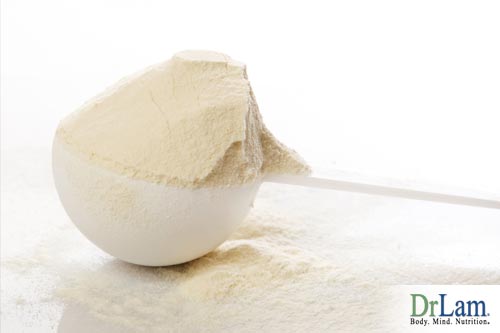 Less than 30 years ago, the prevailing medical wisdom declared that "senility" was the result of either normal aging or hardening of the arteries. Today we are getting closer to truly understanding the causes of the major neurological disease of old age, the aging brain, for which one of the many symptoms is failing memory. As the brain ages, mental and physical functions are impaired. The most extreme form of this process can lead to death. Research into brain boosting supplements and lifestyle choices are showing promise into anti-aging for the brain.
Less than 30 years ago, the prevailing medical wisdom declared that "senility" was the result of either normal aging or hardening of the arteries. Today we are getting closer to truly understanding the causes of the major neurological disease of old age, the aging brain, for which one of the many symptoms is failing memory. As the brain ages, mental and physical functions are impaired. The most extreme form of this process can lead to death. Research into brain boosting supplements and lifestyle choices are showing promise into anti-aging for the brain.
While the rest of our body reaches its prime around age 30, starting its natural progression of declining health soon thereafter, our brain does not start losing its major functions until our 60s. The indicator of an aging brain is a loss of brain tissue with men losing brain tissue almost three times faster than women, according to a study conducted at the University of Pennsylvania in 1999. The use of brain boosting supplements may be able to push the loss of brain function off to an even later stage or decrease the rate of functionality loss.
Four million Americans suffer from dementia, the hallmark of Alzheimer's Disease (AD). This number is expected to swell fourfold by the year 2040. 12% of people aged 60 and above, and 50% of those over 80 years of age, suffer from dementia, and the main cause is AD. Dementia is the fourth leading cause of death in those over 60. AD alone kills 100,000 people per year in the U.S.A. Onset of symptoms can start as young as 40 and continue for about 20 years before severe symptoms - such as loss of memory, inability to carry out normal work and being irritable and suspicious - show.
Current treatment of dementia and AD include drugs (medications such as Aricept, anti-inflammatory drugs such as ibuprofen), hormones (DHEA, estrogen), nutritional supplementation with brain boosting supplements (membrane stabilizers such as Phosphatidylserine, herbs such as Gingko Biloba, Butcher's Broom, Cat's Claw, amino acids such as L-Glutamine and Tyrosine, antioxidants such as Vitamin A, C, E and Selenium) and brain exercises such as mental stimulation exercises.
AD is a degenerative disease characterized by progressive mental deterioration, memory loss, and dementia. Memory and abstract thought processes are impaired. Symptoms include depression, disorientation of space and time, inability to concentrate and communicate, loss of bladder and bowel control, memory loss, personality change, and severe mood swings. Death usually occurs within 5 to10 years as the individual becomes totally incapacitated. Nerve fibers surrounding the hippocampus, the brain's memory headquarters, become tangled and shrunken. Information cannot be properly transmitted, new memory cannot be formed, and old memories cannot be retrieved. Characteristic plaques of beta-amyloid protein build up and damage nerve cells. The use of brain boosting supplements may prove to minimally assist with the lack of functions.
There are no reliable and accurate markers, in the form of blood tests, of dementia and AD. A brain scan is helpful in marking the progression of the disease by indicating the brain's glucose metabolism rate. A test measuring electrical activity in the brain can be helpful, but not definitive. The measurement of the amount of beta-amyloid found in spinal fluid is not a definitive diagnostic tool either. Diagnosis of AD is not straightforward and rests largely on a combination of clinical findings, confirmed by a specific set of physiological changes in the brain.
 While the average age of an AD patient is in the 70s, the disease begins to make its appearance years earlier (in the 40s, 50s, or 60s) as mental problems such as chronic forgetfulness and difficulty in handling routine chores. During this borderline state, called mild cognitive impairment (MCI), people are not demented but they do perform worse than their peers on memory tests. Family members are the first to notice this impairment. People who meet the criteria for MCI will degenerate into clinical AD at the rate of 10-15% percent a year, according to Ronald Peterson, director of the Mayo Alzheimer's Disease Center. By contrast, normal elderly people deteriorate at the rate of 1-2% per year.
While the average age of an AD patient is in the 70s, the disease begins to make its appearance years earlier (in the 40s, 50s, or 60s) as mental problems such as chronic forgetfulness and difficulty in handling routine chores. During this borderline state, called mild cognitive impairment (MCI), people are not demented but they do perform worse than their peers on memory tests. Family members are the first to notice this impairment. People who meet the criteria for MCI will degenerate into clinical AD at the rate of 10-15% percent a year, according to Ronald Peterson, director of the Mayo Alzheimer's Disease Center. By contrast, normal elderly people deteriorate at the rate of 1-2% per year.
If you have relatives with AD, your chance of developing AD is higher than the general population. 49% of relatives of AD patients develop the disease by age 87.
It is important not to over-diagnose AD. There is a group of normal, aging adults who feel forgetful but perform well on cognitive tests. This "worried well" group develops AD at the rate of 3% per year. Forgetting where you put your keys is not AD. Not knowing what you should do with your keys can be a form of dementia.
There is no set protocol that is suitable for everyone. Study the following 11 steps to pick the ones most suitable for you. Try to adopt one protocol at a time and practice it for at least 21 days continuously to get into a good habit for that one step before proceeding to the next applicable step.
The steps listed are not in order of importance.
Researchers at the Massachusetts Institute of Technology discovered that levels of choline and ethanolamine are significantly lower in those suffering from AD compared to normal people. Both choline and ethanolamine are used for the synthesis of phospholipids (PL), which are major components of the cell membranes of neurons in the brain. With four other phospholipids (PL-choline, PL-ethanolamine, PL-inositols, and sphingomyelines), they fit side by side, holding the cell membrane together with proteins and other membrane constituents inserted and secured between. PL optimizes a variety of functions that occur at the nerve membrane of each nerve cell. Clinical trials indicate that phosphatidylserine (PS) benefits cognitive impairment such as memory, learning, vocabulary skills, and concentration, as well as mood, alertness, and sociability, after receiving 100 mg of PS three times a day. One study in the Journal of Neurology (1991) reported that 149 patients who took 300 mg of PS daily for 12 weeks showed clinical global ratings of improvement in standard neuropsychological performance tests. PS also works synergistically with vitamin B12 supplementation and other brain boosting supplements. Animal studies showed improved memory acquisition and retention in rats with memory impairment following lesioning of nucleus basilis and supplementing with PS and vitamin B12. PS also has a positive effect alleviating depressive disorders associated with the geriatric patient, as shown in a study in which patients who were given 300 mg/day of PS for 30 days showed consistent improvement in depressive symptoms, memory, and behavior.
Solution:
Phosphatidylserine: 30 - 120 mg a day to enhance cell membrane stability.
 Dementia can result from atherosclerosis that cuts off blood supply to the brain. The death of brain tissue can also arise from strokes, tumors, hypothyroidism, advance syphilis, and other causes. Decrease of blood flow to the brain caused by hardening of the arteries is a significant contributing factor to dementia and memory loss.
Dementia can result from atherosclerosis that cuts off blood supply to the brain. The death of brain tissue can also arise from strokes, tumors, hypothyroidism, advance syphilis, and other causes. Decrease of blood flow to the brain caused by hardening of the arteries is a significant contributing factor to dementia and memory loss.
On of many brain boosting supplements would be gingko. Ginkgo comes from a tree called Ginkgo Biloba. It has been used for more than 5,000 years and is the most popular prescription drug in Germany and France for treating symptoms of aging and deteriorating memory. In 1988 alone, it was prescribed more than 5 million times. Extensive studies conducted in animals and humans have been published on ginkgo, confirming gingko's ability to stimulate blood flow to the brain by dilating blood vessels, and decreasing platelet aggregation, besides being a powerful antioxidant.
Researchers consistently find a link between treatment with gingko and improvement in cognitive performance in test subjects making it one of the most well known in the brain boosting supplements category. Two German studies in 1991 showed that in older patients with a history of more than 2 years of brain disturbance, after three months, those given gingko showed an improvement in mental function of 72% compared to only 8% improvement in those given a placebo. As a result of treatment with gingko, cerebral vascular flow is improved, early AD is slowed, and memory is improved. The standardized form of gingko is called Egb761 and contains 24% flavone glycosides. In one double blind study, 2 doses of 320 mg or 600 mg of Ginkgo Biloba were given to 18 elderly adults with mean age of 69.3. 1 hour later, they were tested for speed of information processing. Results showed that those given ginkgo had a significant improvement in speed of information processing.
Usual intake of ginkgo is 30 - 60 mg 2 - 4 times a day. In Germany, common dosage for AD is 240 mg a day. It generally takes 6-12 weeks before any benefit is seen. Adverse reactions include slightly upset stomach, headache, and slight dizziness in elderly patients on 120 - 180 mg or more a day. Due to its blood thinning properties, those on blood thinners such as coumadin or aspirin, should consult their physician first before starting gingko as a dietary supplement.
A few brain boosting supplements include butcher's broom, cat's claw, and bilberry. Butcher's broom contains alkaloids. It improves circulation and has been helpful in thrombophlebitis, varicose veins, and vertigo. It is more effective when taken with vitamin C. Cat's claw is an herb that contains polyphenols and proanthocyanidins as active ingredients. It enhances the action of white blood cells, and acts as an antioxidant and anti-inflammatory. Bilberry contains fatty acids essential for cell wall integrity.
 The Amino acid L-Taurine works synergistically with gingko, Vitamin B12, and zinc to help prevent AD. L-Taurine is an ion and pH buffer in the heart, skeletal muscle, and central nervous system. It also helps to prevent abnormal blood clotting. It lowers blood pressure and reduces risk of atherosclerosis. It facilitates the digestion of dietary fat and prevents the formation of cholesterol gallstones. For these reasons, L-Taurine is commonly used as an adjunct nutrient in brain health. Common intake is 200 - 500 mg a day, while therapeutic doses are as high as 3,000 - 5,000 mg a day.
The Amino acid L-Taurine works synergistically with gingko, Vitamin B12, and zinc to help prevent AD. L-Taurine is an ion and pH buffer in the heart, skeletal muscle, and central nervous system. It also helps to prevent abnormal blood clotting. It lowers blood pressure and reduces risk of atherosclerosis. It facilitates the digestion of dietary fat and prevents the formation of cholesterol gallstones. For these reasons, L-Taurine is commonly used as an adjunct nutrient in brain health. Common intake is 200 - 500 mg a day, while therapeutic doses are as high as 3,000 - 5,000 mg a day.
Solution:
A common cause of memory loss is insufficient supply of necessary nutrients to the brain. If the blood is "thick" with cholesterol and triglycerides, the amount of nutrient-rich blood that can pass through the blood brain barrier decreases. Malnourishment of the brain can occur, especially if the condition is chronic in nature.
Deficiencies in amino acids and B vitamins, especially Vitamins B6 and B12, are other modifiable causes of dementia. Deficiency of Vitamin B12 produces pseudo-AD symptoms. 25% of people over age 60 - 69 and 40% of people over age 80 are deficient in Vitamin B12, since older people produce insufficient intrinsic factor, a substance necessary for the absorption of Vitamin B12 from the intestines.
No one should accept a diagnosis of AD without first undergoing a trial of intensive nutritional therapy, especially Vitamin B12 injections and utilization of other brain boosting supplements.
Solution:
Make sure you are not deficient in Vitamin B6 or B12. Trial of Vitamin B12 supplementation or injection may be indicated.
Levels of antioxidants Vitamin A, E, and the carotenoids (including beta-carotene) are also low in people with dementia and AD. These nutrients act as free radical scavengers, a deficiency of which may expose the brain cells to increased oxidative damage.
Long term longitudinal studies in Switzerland spanning 22 years, from 1971 to 1993, and involving 442 subjects aged 65 to 94, have shown that higher ascorbic acid and beta-carotene plasma levels are associated with better performance in terms of memory and recall. Laboratory studies in aged rats support evidence that chronic antioxidant treatment can improve cognitive function during aging, supporting the free radical hypothesis of aging as it relates to brain function.
In addition, people with AD have been found to be deficient in potassium, boron, and selenium.
Solutions:
 Research shows that stress and depression may cause some forms of memory loss. Prolonged depression or stress leads to elevated levels of plasma cortisol, a "stress" hormone produced by the adrenal glands. Cortisol appears to shrink the hippocampus, the central unit in the brain that is associated with AD. Elevated levels of cortisol during prolonged depression appear to wear down the hippocampus. When depression is treated, cognitive function, including memory, improves. The earlier symptoms are recognized, the more likely the deterioration can be slowed. Much more research is needed, as it is still unclear if all patients with AD have elevated plasma cortisol levels. Phosphatidylserine enhances cortisol-receptor sensitivity and restores hypothalamic sensitivity to cortisol through its membrane stabilization properties, resulting in reduced damage and restoration of healthy, normal cortisol levels. Brain boosting supplements have been shown to aid in depression.
Research shows that stress and depression may cause some forms of memory loss. Prolonged depression or stress leads to elevated levels of plasma cortisol, a "stress" hormone produced by the adrenal glands. Cortisol appears to shrink the hippocampus, the central unit in the brain that is associated with AD. Elevated levels of cortisol during prolonged depression appear to wear down the hippocampus. When depression is treated, cognitive function, including memory, improves. The earlier symptoms are recognized, the more likely the deterioration can be slowed. Much more research is needed, as it is still unclear if all patients with AD have elevated plasma cortisol levels. Phosphatidylserine enhances cortisol-receptor sensitivity and restores hypothalamic sensitivity to cortisol through its membrane stabilization properties, resulting in reduced damage and restoration of healthy, normal cortisol levels. Brain boosting supplements have been shown to aid in depression.
Solutions:
The average person aged 65 is likely to be taking between 8 and 10 different prescription and / or over-the-counter drugs. Drug interactions, coupled with a nutrient poor diet, often results mental symptomatology in addition to physical problems. Chronic alcohol abuse can lead to symptoms closely resembling AD.
Solutions: Cut down the number of medications as much as possible.
Research has revealed that it is common for people with AD to have high aluminum and mercury levels in their brain. There are many common sources of aluminum. Aluminum is commonly found in cookware (doubling the amount of aluminum we consume), in antacids (like Gaviscon®, Maalox®, Mylanta®), and in anti-diarrhea medications (like Kaopectate® and Pepto-Bismol®). In deodorants, the aluminum chlorhydrate in anti-perspirants is readily absorbed into the brain from the nasal passage. Aluminum is also found in food additives (baking powder contains from 5 - 70 mg of sodium aluminum sulfate per teaspoon). Lead toxicity have also been linked to higher incidence of AD.
Research done at University of Kentucky found that people with AD also have higher levels of mercury than a control group. Metal mercury from dental amalgam surfaces in the mouth has also been linked to people with AD. The AD group also has higher ratios of mercury to selenium and zinc (metals which help protect the body against the toxic effects of mercury).
Solutions:
Women with AD have lower estrogen levels than their healthy counterparts. According to Richard Mayeux who monitored about 1,100 New York city women for up to 5 years for the appearance of AD, postmenopausal women who had taken estrogen for longer than a year showed a risk of developing AD reduced by almost 50%. Recent studies have suggested that estrogen replacement therapy (ERT) may have a protective effect on cognitive function and may reduce the risk of AD. In the Baltimore Longitudinal Study of Aging, 116 women who reported that they were receiving ERT during a cognitive assessment were compared to 172 women who had never received ERT. Those receiving ERT had fewer errors on test of short-term visual memory, visual perception, and constructional skills.
Certain hormones, including DHEA and human growth hormone have been shown to improve memory.
Solution: Taking estrogen as a preventive measure for AD is not widely recommended due to the complications of hormone replacement therapy.
 People with complex jobs have a lower risk of AD, according to Richard Mayeux, director to the Taub Institute on AD and the Aging Brain at Columbia University.
People with complex jobs have a lower risk of AD, according to Richard Mayeux, director to the Taub Institute on AD and the Aging Brain at Columbia University.
Solution: Participate in mental exercises like reading, doing puzzles, debates etc. on a daily basis.
People who are aerobically fit tend to suffer less cognitive decline with normal aging and have less chances of developing AD. When Fred Gage of the Salk Institute for Biological Studies in La Jolla, California, allowed mice to run at will - about five kilometers a day, they generated many more neurons in their hippocampus area compared to their sedentary counterparts.
A well-balanced exercise program is the key to optimum mental health along with the use of brain boosting supplements. While most people think of exercise as a way to reduce body weight, exercise does much more, including reducing insulin resistance and impotence.
A well-balanced exercise must include three components:
Ideally, about 2000 calories should be burned per week. Working out with 30 minutes of aerobics exercise at moderate intensity 5 times a week plus 15-20 minutes of strength training 3 times a week will accomplish this goal.
2% of Americans have 2 copies of a gene that produces apolipoproetien E4 that transports cholesterol through the bloodstream and changes the form of amyloid in the brain. These people have a 50% chance of getting AD before age 70. The development of a vaccine to spur the body's own immune system to clear the amyloid is in experimental stages. Studies involving twins and family members are underway to look at the correlation of incidence of AD along familial lines. One study showed that relatives have a higher risk, approaching 49% by age 87. The risks were similar among parents and siblings. It is interesting to note that female relatives appear to develop the disease earlier than male.
With the human genome mapping completed, it is just a matter of time before genetically engineered drugs will surface.
Solutions: Keep yourself in good shape while you wait for genetic therapy to arrive, most likely in five to ten years.
A deteriorating and aging brain brings into focus the very essence of the meaning of life and for many, the definition of "quality of life". The older you get, the greater your chance of getting dementia and Alzheimer's Disease. The use of brain boosting supplements may be able to stave off the worst of these conditions. Successful preventive and palliative strategy involve:
Taking nutritional brain boosting supplements for optimal brain health
Lifestyle modifications that enhance brain health
 Avoid alcohol, smoke, processed food, environmental toxins such as aluminum and mercury.
Avoid alcohol, smoke, processed food, environmental toxins such as aluminum and mercury.Consult a physician to consider the following
New treatments that are on the horizon, but still years away, include vaccines and gene therapy.
Many studies have suggested that non-steroidal anti-inflammatory drugs, such as ibuprofen, are associated with reduced risk of AD, but other results have been contradictory. The jury is still out and it may take years to hear the results of the various clinical trials that are underway.
Production of beta-amyloid (a hallmark feature of AD) can be inhibited by protease-inhibiting drugs. Such drugs are entering clinical trials. It is hoped that cutting back amyloid production will prevent AD. Similar medicines have met with great success in the past, including the protease inhibitors that have recently revolutionized HIV treatment. It remains to be proven whether protease-inhibition is enough to beat dementia and AD.
Cat's Claw has anti-fungal, anti-inflammatory, and immunostimulant properties that help increase one's immune system. But it needs to work synergistically with other herbs to work more effectively.
References
Allain H et al. Effect of two doses of Ginkgo biloba extract (Egb 761) on dual-coding test in elderly subjects. Clin Ther 1993 May-Jun; 15(3): 549-58.
Balch J., Balch P. Prescription for Nutritional Healing, Avery Publishing Group, New York, 1997.
Breitner JC et al. Familial aggregation in Alzheimer's disease: comparison of risk among relatives of early- and late-onset cases, and among male and female relatives in successive generations. Neurology 1988 Feb; 38(2): 207-12.
Cavanaugh JC et al. Forgetting and use of memory aids in 20 to 70 years olds everyday life. Int J Aging Hum Dev 1983; 17(2): 113-22.
Crook T et al. Effects of phosphatidlyserine in Alzheimer's disease. Psychopharmacol Bull 1992; 28(1): 61-6
Deijen JB et al. Vitamin B6 supplementation in elderly men: effects on mood, memory, performance and mental effort.
Elias PK et al. Blood pressure, hypertension, and age as risk factors for poor cognitive performance. Exp Aging Res 1995 Oct-Dec; 21(4): 393-417.
Grassel E. Effect of Ginkgo biloba extract on mental performance. Double-blind study using computerized measurement conditions in patients with cerebral insufficiency. Fortschr Med 1992 Feb 20; 110(5): 73-6.
Maggioni, M et al. Effects of phosphatidylserine therapy in geriatric patients with depressive disorders. Acta Psychiatr Scand 1990 Mar; 81(3): 265-70.
Masuda Y, et al. EGG phosphatidylcholine combined with vitamin B12 improved memory impairment following lesioning of nucleus basalis in rats. Life-Sci. 1998; 62(9): 813-22.
Meneses A et al. Effects of aging and hypertension on learning, memory, and activity in rats. Physiol Behav 1996 Aug; 60(2): 341-5.
Oken BS et al. The efficacy of Ginkgo biloba on cognitive function in Alzheimer's disease.
Perrig WJ. The relationship between antioxidants and memory performance in the old and very old. J Am Geriatr Soc 1997 June; 45(6): 718-24.
Powell LS et al. Alzheimer's Disease: A Guide for Families. Perseus Press, 1993.
Resnick SM et al. Estrogen replacement therapy and longitudinal decline in visual memory. Neurology 1997 Dec; 49(6): 1491-7.
Satoh T et al. Walking exercise and improved neuropsychological functioning in elderly patients with cardiac disease. J Intern Med 1995 Nov; 238(5): 423-28.
Socci DJ et al. Chronic antioxidant treatment improves cognitive performance of aged rats.
Winter JC. The effects of an extract of Ginkgo biloba Egb761, on cognitive behavior and longevity in the rat. Pysiol Behav 1998 Feb 1; 63(3): 425-33.
Warren Tom. Beating Alzheimer's. Avery Publishing Group, 1991.
© Copyright 2001 Michael Lam, M.D. All Rights Reserved.

